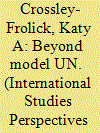| Srl | Item |
| 1 |
ID:
097070


|
|
|
|
|
| Publication |
2010.
|
| Summary/Abstract |
The Model United Nations format is one of the most popular active learning techniques to teach students about the evolving system of global governance and the limits of international organizations. In a world where the UN must cooperate with a variety of actors in the international system to address global challenges, students can benefit from simulations that draw on the intergovernmental Model United Nations format, but move beyond it to explore the complexities of negotiation involving state and nonstate actors. This paper discusses the use and development of a simulation for an upper-level international organization course loosely modeled on the XV International AIDS Conference held in Bangkok, Thailand in July 2004. It explores the value of the simulation, including learning objectives and expectations, student preparation in advance of the simulation, post-simulation debriefing, and an assessment of how the simulation can be modified and made more effective.
|
|
|
|
|
|
|
|
|
|
|
|
|
|
|
|
| 2 |
ID:
156642


|
|
|
|
|
| Summary/Abstract |
This article traces the evolution of a postwar leitmotif of German foreign policy, Verantwortungspolitik (politics of responsibility), first articulated by Foreign Minister Hans-Dietrich Genscher in 1975. In its original Genscher formulation, Verantwortungspolitik emphasized several important features of German behavior on the world stage, including restraint, multilateralism, and humanitarianism. Since the end of the Cold War, German foreign policymakers have steadily revised and reimagined the leitmotif, stressing the importance of Germany’s international responsibilities and the need to close the gap between Germany’s power (capabilities) and willingness to assume a more prominent international role, including a readiness to use force, particularly when human rights are at stake. Although articulation of the norm is fairly persistent, its meaning has changed as Germany confronts new challenges on the global stage. This has important implications for how, where, and when Germany engages internationally and the instruments it utilizes to achieve its foreign policy objectives.
|
|
|
|
|
|
|
|
|
|
|
|
|
|
|
|